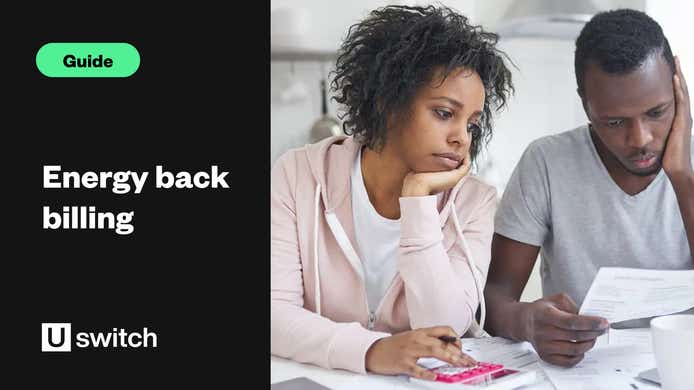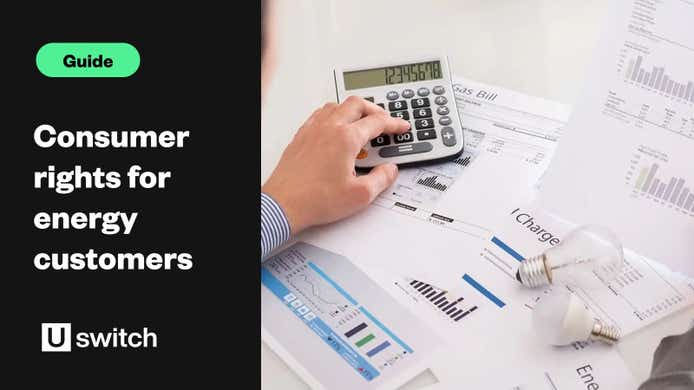Reclaiming this credit is easier than ever before, now that energy regulator Ofgem has implemented rules forcing suppliers to reimburse you if you ask - unless there is a good reason not to do so.
This guide will explain how to find out if you’re in credit to your energy supplier, how to get your energy credit refunded and how to make sure your bills are accurate in future. We will also consider how to get back any credit owed by a previous supplier. If you do decide to contact your current supplier to ask for a refund, it is important to note that you need to provide an up-to-date meter reading and discuss your current situation with them. A meter reading from a few months ago won't do.
What does "in credit" on my energy bill mean?
If you're in credit on your energy bill, that means you've used less energy than you've paid your supplier for. This isn't a bad thing unless you're paying more than you can realistically afford, in which case you should talk to your supplier about reducing your payments. If you're in credit, though, you can ask your supplier for a refund.
How can I find out if I’m in credit to my energy supplier?
If you manage your bills online it should be as easy as logging in to check your current account balance. If you don’t, then simply take a look at your latest energy bill. The bill should tell you how much you are in debit or credit to your gas and electricity supplier.
It’s worth noting that British Gas and ScottishPower refund customer credit automatically. They will automatically return credit over £75 every 12 months, from the anniversary of the date you took out your direct debit. However, research has shown that automatic refunds still aren’t the norm for suppliers in general, as over half of billpayers are having to chase their supplier for a refund instead of receiving them automatically.
Why am I in credit? Is my supplier taking too much from my direct debit?
Energy bills, and in particular direct debits, are estimated based on your previous consumption. That means they may be some way off your actual gas and electricity consumption.
For example, if you have a child who's left for university, but you ran an energy price comparison before they left home, your consumption for the following year will be estimated on figures which included your child's consumption. With them out of the house, you will be using less energy and will be overpaying on your direct debit.
Don’t worry about losing out on savings, though. If your direct debit is too high, all you need to do is claim back what you’ve overpaid. You can find out more about paying by direct debit here.
How much could I be owed?
The amount of money you could be in credit by depends on how much you’ve overpaid by. Factors which will influence the total sum you’re entitled to could include a mild winter or long summer. In both these scenarios you may have used less energy to heat your home than you were expected to.
Should I get a refund?
Ordinarily, it would make sense to get a refund from your energy supplier if you're eligible for one. However, with energy prices still historically high as of July 2024, it could be worth keeping any credit you have in your energy account to help cover these higher prices if needed.
How can I get an energy refund from my current supplier?
If you know you’re in credit and you want the money back, then all you need to do is ask for a refund. We’ve listed the phone numbers of some suppliers to call in the table below.
A word of warning, though: even if you are in credit, it’s a good idea to discuss your balance with your supplier before asking to be refunded. Your direct debit should have been worked out to cover your expenditure over the year, so although you might be overspending in summer, this should even out in winter. Be wary of asking for a refund of any credit meant to cover your additional winter expenditure because your supplier may ask you to increase your payments to compensate.
You should also make sure your credit balance is up to date - even a meter reading issued the previous month should be considered out of date if you want to claim a refund. However, if you find yourself more than one month in credit, it’s usually safe to ask for your money back.
How can I get a refund from my previous energy supplier?
If you were in credit when you switched, it’s possible that your previous energy supplier still has some money that belongs to you.
Energy suppliers are bound by Ofgem to give back any money you are in credit by when you switch to another provider. Suppliers have six weeks after a customer switches to send them a final bill, and 10 days after that to refund any credit that remains on the customer's account. If they don't work within these timeframes, they are required to compensate you. They have to refund any credit you are owed, no matter how long ago the account was closed.
If you think you're owed a refund, then check your bank statements, direct debits or energy bills, or just give them a call on one of the numbers listed below:
| Supplier | Phone | Chatbot? | Text | ||
|---|---|---|---|---|---|
| Boost | 0330 102 7517 (Monday to Friday - 8am-6pm, Saturday - 9am-2pm) | N | Y | N | N |
| British Gas | 0330 100 0056 (Monday to Friday - 9am-5pm) | N | Y | N | N |
| Co-op Energy | 0808 164 1088 | N | N | N | N |
| EDF | 0333 200 5100 or 0800 096 2929 text telephone for those with hearing difficulties (Weekdays - 8am-6pm, Saturday - 8am-2pm) | N | Y | 07480 802 942 (Weekdays 7am-11pm, Weekends 8am-8pm) | 07481 341 928 (Weekdays 7am-11pm, Weekends 8am-8pm) |
| E.ON Next | 0808 501 5200 or 0808 501 5200 text telephone for those with hearing difficulties (Monday to Thursday - 9am-5pm, Friday - 9am-4pm) | hi@eonnext.com | Y | 0808 501 5200 | N |
| Good Energy | 0345 034 2400 (Monday to Friday - 9am-5pm) | hello@goodenergy.co.uk | N | N | N |
| Octopus | 0808 164 1088 (Monday to Thursday - 9am-5pm, Friday - 9am-4pm) | hello@octopus.energy | N | N | N |
| OVO | 0330 303 5063 (Monday to Friday - 9am-5pm) | N | N | N | N |
| ScottishPower | 0345 270 0700 (Monday to Friday - 9am-5pm) | N | Y | N | N |
| So Energy | 0330 111 5050 (Monday to Friday - 9am-5pm) | help@so.energy | N | N | N |
| Utilita | 0330 3337 442 | N | Y | N | N |
| Utility Warehouse | 0333 777 0777 (Monday to Friday - 8am-7.45pm, Saturday - 9am-4.30pm, bank holidays - 10am-4pm) | Y (fill in form) | N | N | N |
What if my supplier refuses to refund me?
If your supplier refuses to refund you and you don't agree with the reasons given, you can raise the issue with the Energy Ombudsman.
What can I do to make sure my bills are as accurate as possible?
To avoid being in a situation where you are over or underspending on energy, do your best to provide at least one meter reading per month to your energy supplier. As the price cap now changes four times a year, make sure you're submitting readings as close to the date of the new price cap coming in as possible.
How can I make my energy bills lower?
There are plenty of ways to save energy and cut down your bills. In addition, if you want to optimise your energy consumption, consider getting hold of a smart thermostat. These thermostats help you figure out exactly how much energy you consume, as well as control your heating from a distance. Some smart thermostats will even learn your behaviour and run your heating accordingly.
In addition, smart meter statistics show a 95.5% accuracy rate when it comes to smart meters reporting your energy consumption to your supplier. This means there is less chance of human error when reporting how much energy you have used and means you're more likely to be charged the correct amount.
Finally, run a quick energy comparison. Energy deals are back on the market, so it’s always a good idea to check that you’re on the best tariff. Compare energy prices by entering your postcode below.
Run an energy comparison
Enter your postcode below to compare energy prices and get started on your energy switch.




